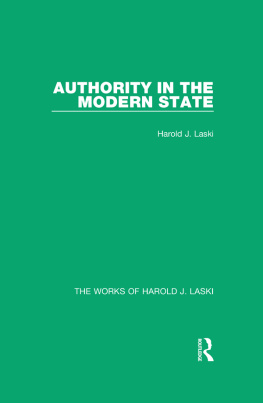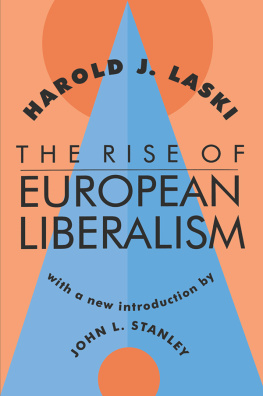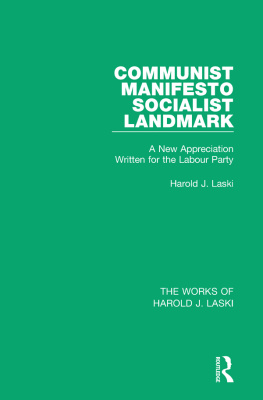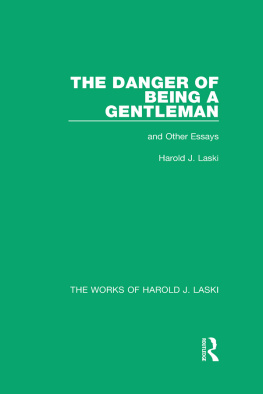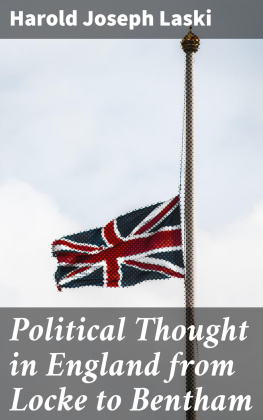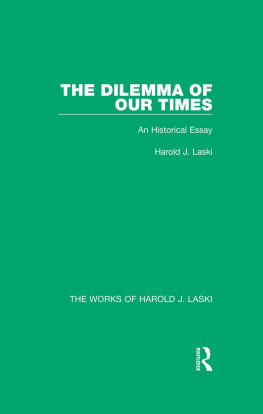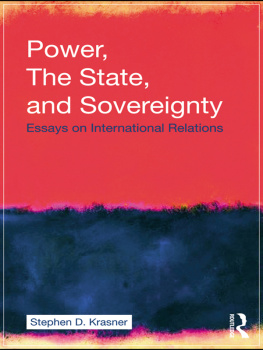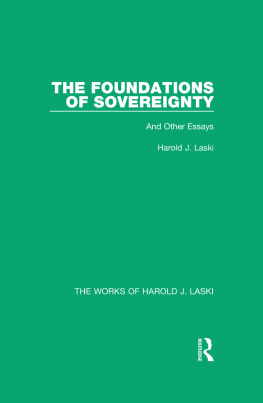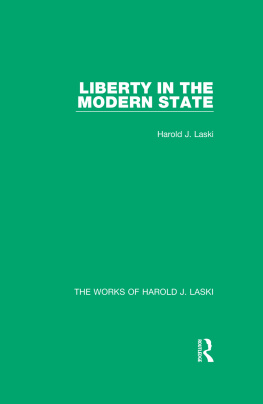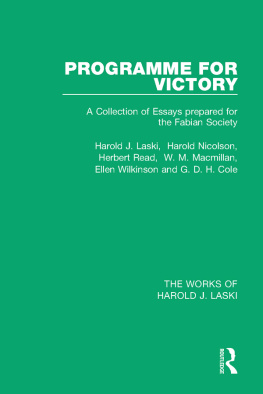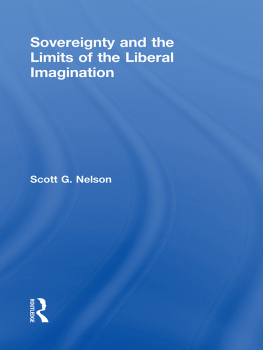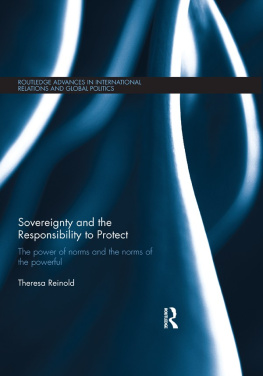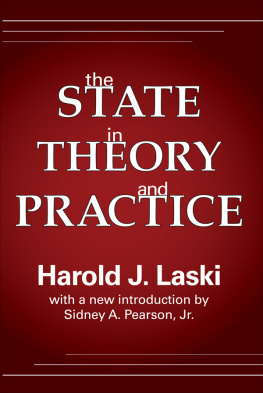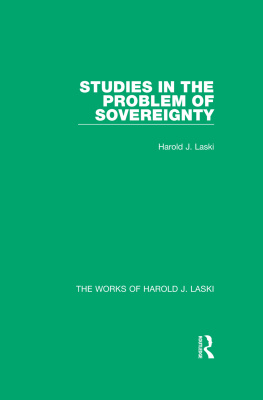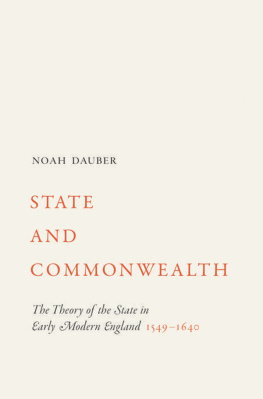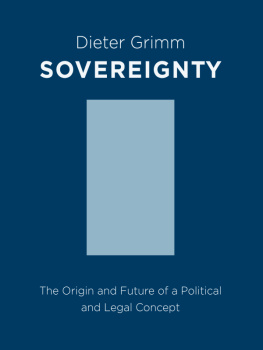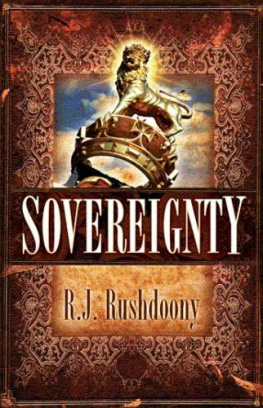THE WORKS OF HAROLD J. LASKI
Volume 2
AUTHORITY IN THE MODERN STATE
First published in 1919
This edition first published in 2015
by Routledge
2 Park Square, Milton Park, Abingdon, Oxon, OX14 4RN
and by Routledge
711 Third Avenue, New York, NY 10017
Routledge is an imprint of the Taylor & Francis Group, an informa business
1919 Yale University Press, 1946 Harold J. Laski
All rights reserved. No part of this book may be reprinted or reproduced or utilised in any form or by any electronic, mechanical, or other means, now known or hereafter invented, including photocopying and recording, or in any information storage or retrieval system, without permission in writing from the publishers.
Trademark notice: Product or corporate names may be trademarks or registered trademarks, and are used only for identification and explanation without intent to infringe.
British Library Cataloguing in Publication Data
A catalogue record for this book is available from the British Library
ISBN: 978-1-138-81912-2 (Set)
eISBN: 978-1-315-74273-1 (Set)
ISBN: 978-1-138-82182-8 (Volume 2)
eISBN: 978-1-315-74268-7 (Volume 2)
Publishers Note
The publisher has gone to great lengths to ensure the quality of this reprint but points out that some imperfections in the original copies may be apparent.
Disclaimer
The publisher has made every effort to trace copyright holders and would welcome correspondence from those they have been unable to trace.
TO
MR. JUSTICE HOLMES
AND
FELIX FRANKFURTER
THE TWO YOUNGEST OF MY FRIENDS
I AM tempted to believe that what we call necessary institutions are often no more than institutions to which we have grown accustomed, and that in matters of social constitution the field of possibilities is much more extensive than men living in their various societies are ready to imagine.
Recollections of de Tocqueville,
Page 101.
PREFACE
T HIS volume is in some sort the sequel to a book on the problem of sovereignty which I published in March, 1917. It covers rather broader ground, since its main object is to insist that the problem of sovereignty is only a special case of the problem of authority, and to indicate what I should regard as the main path of approach to its solution. Where, therefore, the previous studies were, in the main, negative and critical, this book is positive and constructive. In the main, the evidence upon which its conclusions are based is French. That is because an earlier study of de Maistre convinced me that it is in France, above all, that the ideals I have tried to depict are set in the clearest and most suggestive light. I had originally intended to follow this volume by a third essay on the political theory of the Conciliar Movement. But it now seems to me more useful to attempt a definitely constructive analysis of politics in the perspective set by the first chapter of this present volume. Accordingly I have planned a full book on the theory of the state which I hope to have ready within a reasonable time.
For so modest a volume this book, like its predecessors, has debts too immense to go without acknowledgement. Among the dead, I would like to emphasise how very much I have learned from Acton and Maitland; their writings have been to me a veritable store-house of inspiration. Among living men, I owe much to Professor Duguit of Bordeaux, to Dr. Figgis, and, in spite of, and perhaps because of, our differences, to Professor Dicey. My old tutor, Mr. Ernest Barker of New College, is the unconscious sponsor of this, as of my earlier book. Indeed, if it has merit of any kind, it is to the teaching of politics in the Modern History School at Oxford that I would ascribe it.
Friends have been generous in their counsel. My colleagues, Dean Pound and Professor McIlwain, have been untiring in their constant encouragement; and from Dean Pounds own writings, soon, one may hope, to be collected in some more permanent form, I learned the value of a pragmatic theory of state-function. My friends of the New Republic, particularly Mr. Francis Hackett, and Mr. Herbert Croly, have given me generous assistance. Mr. Graham Wallas has lent me great aid by friendly and suggestive counsel; arid I found his Great Society an invaluable guide to many difficult paths. To an unknown critic in the London Times I owe the debt that keen comment must always create.
But the great obligation of the book is to Mr. Justice Holmes. It goes too deep for words; and I can only emphasise my consciousness that I shall never know how much I have in these years learned from the talks we have had and the letters he has written. They are things that come but once or twice in a lifetime.
One more personal word the reader will perhaps allow me. I began my other book with a sense that it might give pleasure to my friend A. R. Herron. He was killed before I could finish it. This book would have gone to my friend Frank Haldinstein, scholar of Christ Church and captain in the Royal Engineers. But his name, too, has been added to the list on which the Oxford of my generation will, with undying pride, write those of Arthur Heath, of Nowell Sievers, and of A. D. Gillespieall of them of New College. When I look back on certain magic nights at Oxford and re-read these pages in the light of their memory, I realise how halting they are compared to the things they would have said. But I take it that for them the one justification of this conflict would have been the thought that we who are left are trying in some sort to understand the problems of the state they died to make free. To have known them was an education in liberty.
Lastly, as also firstly, every page of this book has in it the help my wife has given me. But to do more than mention that is unnecessary for either of us.
HAROLD J. LASKI.
April 21, 1918.
Harvard University.
CONTENTS
AUTHORITY IN
THE MODERN STATE
M AN is a community-building animal: it is by reverent contact with Aristotles fundamental observation that every political discussion must now begin. We start with the one compulsory form of human associationthe stateas the centre of analysis. Yet there are few subjects upon which enquiry is so greatly needed as upon the mechanisms by which it lives. Outside our state-context we are, after all, largely unintelligible, must be, as Aristotle so scornfully proclaimed, beasts or gods who defy interpretation. Even in birth we inherit the qualities of unnumbered generations so that a bias is present before ever it has obtained expression. This emphasis upon state-life has become more vital as the scale of existence has become progressively greater. To the unity of interdependence, at least, the world has been reduced, so that, today, the whim of a New York millionaire may well affect the lives of thousands in the cotton-mills of Bombay.1
Not that state-history can in any adequate sense be made the biography of great men. We can even less today accept the epic-theory of Carlyle than that so characteristically contributed by Bolingbroke to Voltaire when he found in the interplay of personal fantasy the true source of events. Not, of course, that history will ever be an exact science in the sense that exactness belongs to mathematical enquiry. It is only magnificent sciolists like Machiavelli who dare to look upon history as an endless cycle. For most it will mainly be what Thucydides strove to make of itthe great store-house of political wisdom. For all history that is not merely annalistic must lead to the formulation of conclusions. It has in it the full materials for a state-philosophy simply because the evidence we possess so largely relates to political life. From Aristotle down to our own time the one constant effort has been the determination of the conditions upon which that life should be lived. And, where the effort has been most fruitful, it has been induction from experience. Systems have helped us little enough. The vague ideal of a revolution, the chance phrase of an orator, the incisive induction of some thinker more deeply-seeing than the restit is upon these that, for the most part, our creeds have been builded. The sources of our principles are as varied as human experience simply because there has, from the outset, been no large tract of human life with which the state has not concerned itself.

